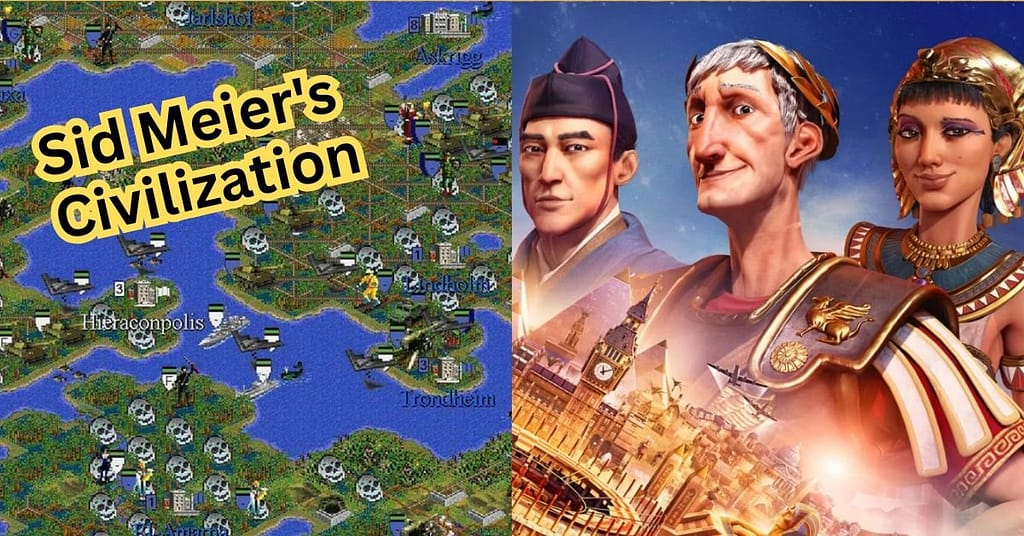Introduction
In the vast world of video games, few titles have left as enduring a legacy as Sid Meier’s Civilization. Since its release in 1991, this game has captivated millions with its unique blend of strategy, history, and diplomacy, offering players the chance to guide an entire civilization from the dawn of time into the future. Unlike other video games that focus on fast-paced action, Sid Meier’s Civilization review challenges players to think deeply, plan ahead, and make decisions that will impact the fate of entire nations. This blog will explore the elements that make Sid Meier’s Civilization a timeless classic, dive into its evolution, and examine why it remains one of the most influential strategy games ever created.
Table of Contents
The Origins of Sid Meier’s Civilization
The Birth of a Game-Changer
Sid Meier’s Civilization was released in 1991 by MicroProse, a game development company founded by Sid Meier and Bill Stealey. The game was groundbreaking at its release because it allowed players to control not just individual characters or small units but entire civilizations. Inspired by historical themes, Civilization combines elements from board games like Risk and Empire, merging them into a unique digital experience that was both educational and thrilling.
Sid Meier’s Vision and Design Philosophy
Sid Meier, the creator of the game, had a clear philosophy: he believed that games should be a series of interesting choices. Unlike other games where players are guided by rigid narratives, Civilization gives players control over nearly every aspect of their empire. This freedom allowed for diverse play styles and outcomes, making each playthrough unique.
Why Is It Called Sid Meier’s Civilization?
The Civilization series carries Sid Meier’s name due to his role as the original designer. Adding his name to the title was a strategic choice by the game’s publisher, MicroProse, to capitalize on his reputation and attract a larger audience. Over time, it became a hallmark of quality in strategy gaming, making “Sid Meier’s Civilization” synonymous with deep, engaging gameplay.
Sid Meier Net Worth
Sid Meier, the legendary game designer, is estimated to have a net worth of around $30 million, largely due to his influential work in the gaming industry, including the Civilization franchise. His contributions to game design have earned him both wealth and recognition as one of the most impactful figures in video game history.
The Gameplay Mechanics of Sid Meier’s Civilization
Building a Civilization from Scratch
Players start Sid Meier’s Civilization with a single settler unit, representing the beginnings of an ancient tribe. From this humble start, they must build cities, gather resources, and expand their empire. The game spans millennia, allowing players to progress through different ages—from the Ancient Era to the Space Age. The gameplay mechanics are designed to simulate real-world challenges, such as managing resources, technological development, and political alliances.
Four Pillars of Gameplay
- Exploration: Players begin on a blank map and must explore to find resources, settle cities, and interact with other civilizations.
- Expansion: Successful players balance growth by expanding their borders, founding new cities, and acquiring resources.
- Exploitation: Utilizing resources, such as food, gold, and strategic materials, is key to building a thriving civilization.
- Extermination: Players must engage in diplomacy, or warfare, to deal with rival civilizations.
The Role of Technology
Technology is central to Sid Meier’s Civilization, as it determines the tools, buildings, and units available to players. Starting with basic discoveries like pottery and masonry, players progress through a tech tree that eventually leads to advanced concepts like robotics and space travel. The tech tree is carefully designed to mirror the evolution of real-world knowledge, giving players a sense of historical progression.

The Evolution of Sid Meier’s Civilization Series
From Civilization I to Civilization VI
Since its initial release, the Civilization series has gone through multiple iterations, each adding new mechanics, graphics improvements, and deeper gameplay. Here’s a brief overview of each major installment:
- Civilization I (1991): The original, introducing the basic mechanics and features that would define the series.
- Civilization II (1996): Introduced improved graphics, a larger tech tree, and additional civilizations.
- Civilization III (2001): Added culture as a mechanic, influencing territory and relationships with other civilizations.
- Civilization IV (2005): Marked a major visual overhaul with 3D graphics, as well as introducing religion as a gameplay mechanic.
- Civilization V (2010): Brought significant changes, including a hex-based grid and removal of unit stacking, fundamentally altering combat and movement.
- Civilization VI (2016): Expanded on Civilization V’s mechanics with city districts, which added complexity to city planning.
What Each Iteration Added
Each version of Sid Meier’s Civilization introduced new features that added complexity and depth. For instance, Civilization III brought the concept of culture, which allowed players to expand their borders without military action. Civilization IV introduced religion, adding a new layer of diplomacy and influence. Civilization V’s hex grid and removal of unit stacking fundamentally changed how players approached combat and movement, and Civilization VI further refined this by introducing city districts, which allowed for more strategic city planning.
Why Players Love Sid Meier’s Civilization
The Appeal of Replayability
One of the key reasons for the series’ enduring popularity is its replayability. Every game is different due to the randomized maps, diverse civilizations, and the numerous paths players can take toward victory. With various ways to win—such as military conquest, cultural dominance, scientific advancement, or diplomatic alliances—Sid Meier’s Civilization encourages experimentation and adaptability.
Educational Value
Many fans appreciate Sid Meier’s Civilization for its educational value. The game introduces players to historical figures, world wonders, and technological advancements, often sparking interest in history and global cultures. For younger players, Civilization can be a gateway to learning about world history and strategy.
Strategic Depth
While many games rely on fast reflexes, Civilization rewards careful planning, foresight, and adaptability. Players must think multiple moves ahead, anticipating the actions of rival civilizations and planning their own development accordingly. This strategic depth appeals to players who enjoy complex, thought-provoking games.
Key Features and Game Modes in Sid Meier’s Civilization VI
Expansions and DLCs
Civilization VI includes several expansions and downloadable content (DLC) packs that add new civilizations, leaders, and gameplay mechanics. Key expansions include Rise and Fall, which introduced loyalty and era mechanics, and Gathering Storm, which added natural disasters and climate change.
Unique Civilizations and Leaders
Each civilization in Sid Meier’s Civilization has unique abilities, units, and buildings, reflecting its historical strengths. For example, Rome has bonuses related to road-building and expansion, while Egypt gains advantages from building wonders. This diversity allows players to choose a civilization that matches their preferred playstyle.
Multiplayer and Online Play
Multiplayer mode allows friends and competitors to test their strategic skills against one another. Online play introduces an added layer of unpredictability, as human players can be more resourceful and cunning than AI opponents. Multiplayer in Sid Meier’s Civilization transforms the experience, requiring even more adaptability and diplomacy.
The Impact of Sid Meier’s Civilization on the Gaming Industry
Influence on Other Strategy Games
Sid Meier’s Civilization set a high standard for strategy games, influencing other popular titles like Age of Empires, Total War, and Stellaris. Its emphasis on decision-making, resource management, and historical themes has become a blueprint for many games within the genre.
Recognition and Awards
The game has won numerous awards and has been praised for its innovation and depth. The Civilization series is widely regarded as one of the greatest video game franchises, consistently ranked among the best PC games of all time. Its impact is seen not only in gaming but also in educational settings, where it’s sometimes used as a learning tool.
The Legacy of Sid Meier
Sid Meier’s name has become synonymous with quality strategy games. His design philosophy—emphasizing player choice and engagement—has influenced game developers worldwide. Sid Meier’s Civilization is a testament to his vision, offering players a unique blend of history, strategy, and creativity.
Will There Be a Sid Meier’s Civilization 7?
While no official release date has been announced, there is significant speculation and anticipation around a potential Civilization VII. Given the franchise’s success and the enduring popularity of Civilization VI, many fans and industry insiders believe that Firaxis Games will eventually announce the next installment, potentially with new mechanics and updated AI.
How Many GB is Civ 6?
The base installation of Civilization VI requires around 12 GB of storage on PC. However, with expansions and downloadable content (DLC), the storage requirement can increase, so players should ensure they have adequate space if they plan to use additional content.
Is Civilization Free on Mobile?
Civilization VI is available on mobile platforms, specifically iOS, as a free-to-download app, though it only includes the first 60 turns of gameplay. To unlock the full game and additional expansions, users must make in-app purchases.
Is Civilization VI Free on PC?
Civilization VI has periodically been offered for free on platforms like the Epic Games Store as part of limited-time promotions, although it typically requires purchase. For users who missed these promotions, the base game can be purchased, and expansions are often available as paid DLCs to enhance the gameplay experience.
The Future of Sid Meier’s Civilization
What’s Next for the Civilization Franchise?
With Civilization VI still popular, fans eagerly await news of Civilization VII. Speculation includes possibilities like more advanced AI, even more detailed civilizations, and potentially more realistic diplomacy systems. The future of the Civilization series seems bright, with fans confident that the developers will continue to innovate while staying true to the core elements that make the game beloved.
Potential for Further Expansion
There’s also potential for expansions and DLCs that explore new historical themes, eras, and cultures. As technology advances, future games might incorporate virtual reality or augmented reality elements, allowing players to experience Sid Meier’s Civilization in immersive new ways.
Conclusion: Sid Meier’s Civilization Review
Sid Meier’s Civilization is more than just a game; it’s a cultural phenomenon that has stood the test of time. With its engaging mechanics, educational value, and strategic depth, it continues to capture the hearts of players around the world. Whether you’re a history buff, a strategy enthusiast, or a newcomer looking for a deep, rewarding gaming experience, Sid Meier’s Civilization offers a journey like no other. As we look forward to future installments, the legacy of Sid Meier’s Civilization is sure to inspire generations of gamers to come.

